Professional Communication II: Weekly Reflective Journal - Session 2a
VerifiedAdded on 2021/04/21
|7
|1175
|59
Journal and Reflective Writing
AI Summary
This document presents a student's reflective journal entries for a Professional Communication II course. The entries cover two key sessions: sensory deficits and communication with patients in pain and on medication, and communicating with older adults with cognitive deficits. The student reflects on learning outcomes, "aha" moments, agreements and disagreements with the content, alternative perspectives, and the implications of the topics on their future nursing practice. The journal entries include discussions on pain management strategies, non-pharmacological interventions, SBAR analysis, and communication tactics for patients with cognitive challenges. The student also references relevant research articles and websites, including the CLPNBC website, to support their understanding and professional development in nursing communication. The student highlights the transfer of learning and the importance of mindful communication strategies in clinical practice, referencing specific articles such as Gironda et al. (2009), Herr (2011), Miller (2009) and Rashidi & Mihailidis (2013).
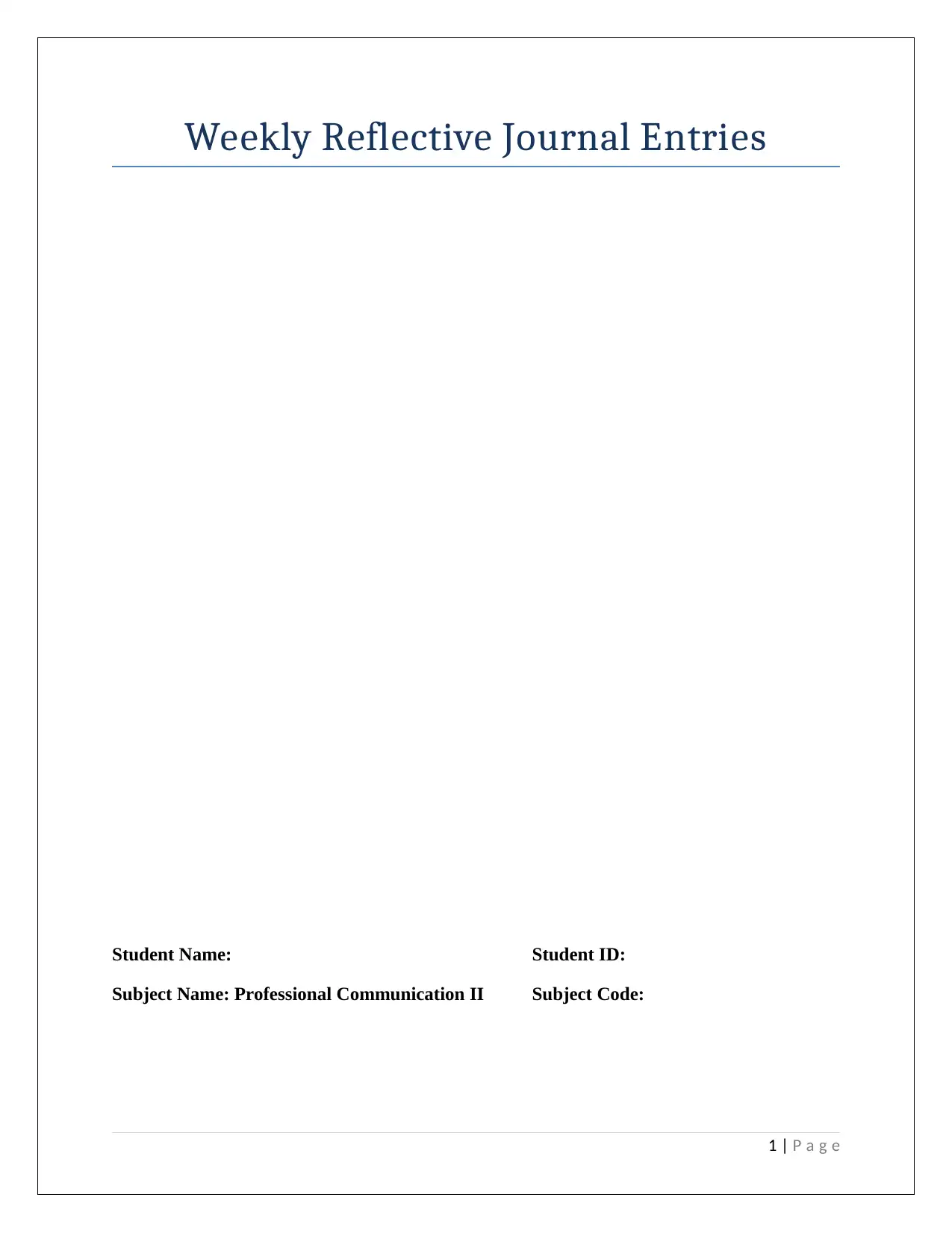
Weekly Reflective Journal Entries
Student Name: Student ID:
Subject Name: Professional Communication II Subject Code:
1 | P a g e
Student Name: Student ID:
Subject Name: Professional Communication II Subject Code:
1 | P a g e
Paraphrase This Document
Need a fresh take? Get an instant paraphrase of this document with our AI Paraphraser
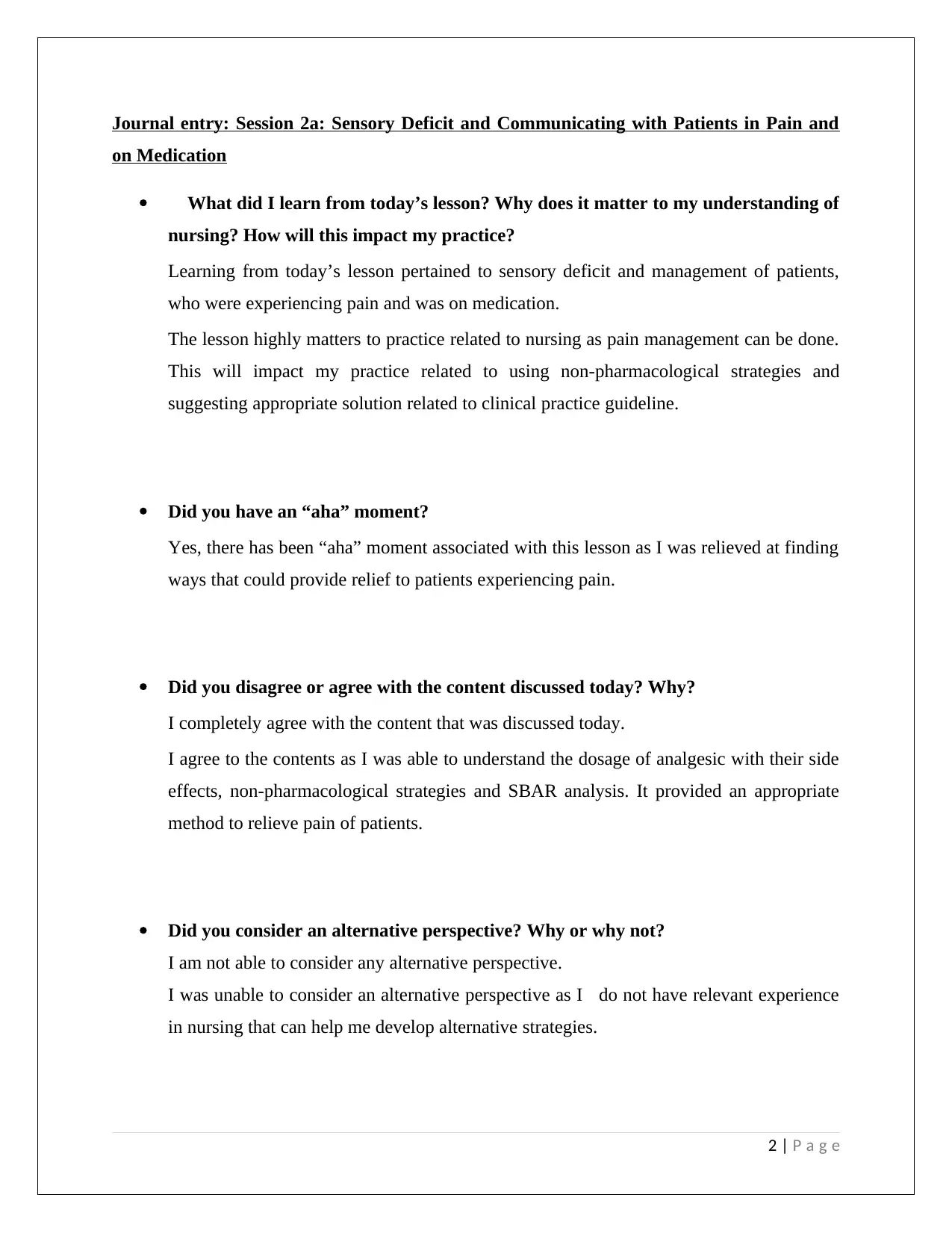
Journal entry: Session 2a: Sensory Deficit and Communicating with Patients in Pain and
on Medication
What did I learn from today’s lesson? Why does it matter to my understanding of
nursing? How will this impact my practice?
Learning from today’s lesson pertained to sensory deficit and management of patients,
who were experiencing pain and was on medication.
The lesson highly matters to practice related to nursing as pain management can be done.
This will impact my practice related to using non-pharmacological strategies and
suggesting appropriate solution related to clinical practice guideline.
Did you have an “aha” moment?
Yes, there has been “aha” moment associated with this lesson as I was relieved at finding
ways that could provide relief to patients experiencing pain.
Did you disagree or agree with the content discussed today? Why?
I completely agree with the content that was discussed today.
I agree to the contents as I was able to understand the dosage of analgesic with their side
effects, non-pharmacological strategies and SBAR analysis. It provided an appropriate
method to relieve pain of patients.
Did you consider an alternative perspective? Why or why not?
I am not able to consider any alternative perspective.
I was unable to consider an alternative perspective as I do not have relevant experience
in nursing that can help me develop alternative strategies.
2 | P a g e
on Medication
What did I learn from today’s lesson? Why does it matter to my understanding of
nursing? How will this impact my practice?
Learning from today’s lesson pertained to sensory deficit and management of patients,
who were experiencing pain and was on medication.
The lesson highly matters to practice related to nursing as pain management can be done.
This will impact my practice related to using non-pharmacological strategies and
suggesting appropriate solution related to clinical practice guideline.
Did you have an “aha” moment?
Yes, there has been “aha” moment associated with this lesson as I was relieved at finding
ways that could provide relief to patients experiencing pain.
Did you disagree or agree with the content discussed today? Why?
I completely agree with the content that was discussed today.
I agree to the contents as I was able to understand the dosage of analgesic with their side
effects, non-pharmacological strategies and SBAR analysis. It provided an appropriate
method to relieve pain of patients.
Did you consider an alternative perspective? Why or why not?
I am not able to consider any alternative perspective.
I was unable to consider an alternative perspective as I do not have relevant experience
in nursing that can help me develop alternative strategies.
2 | P a g e
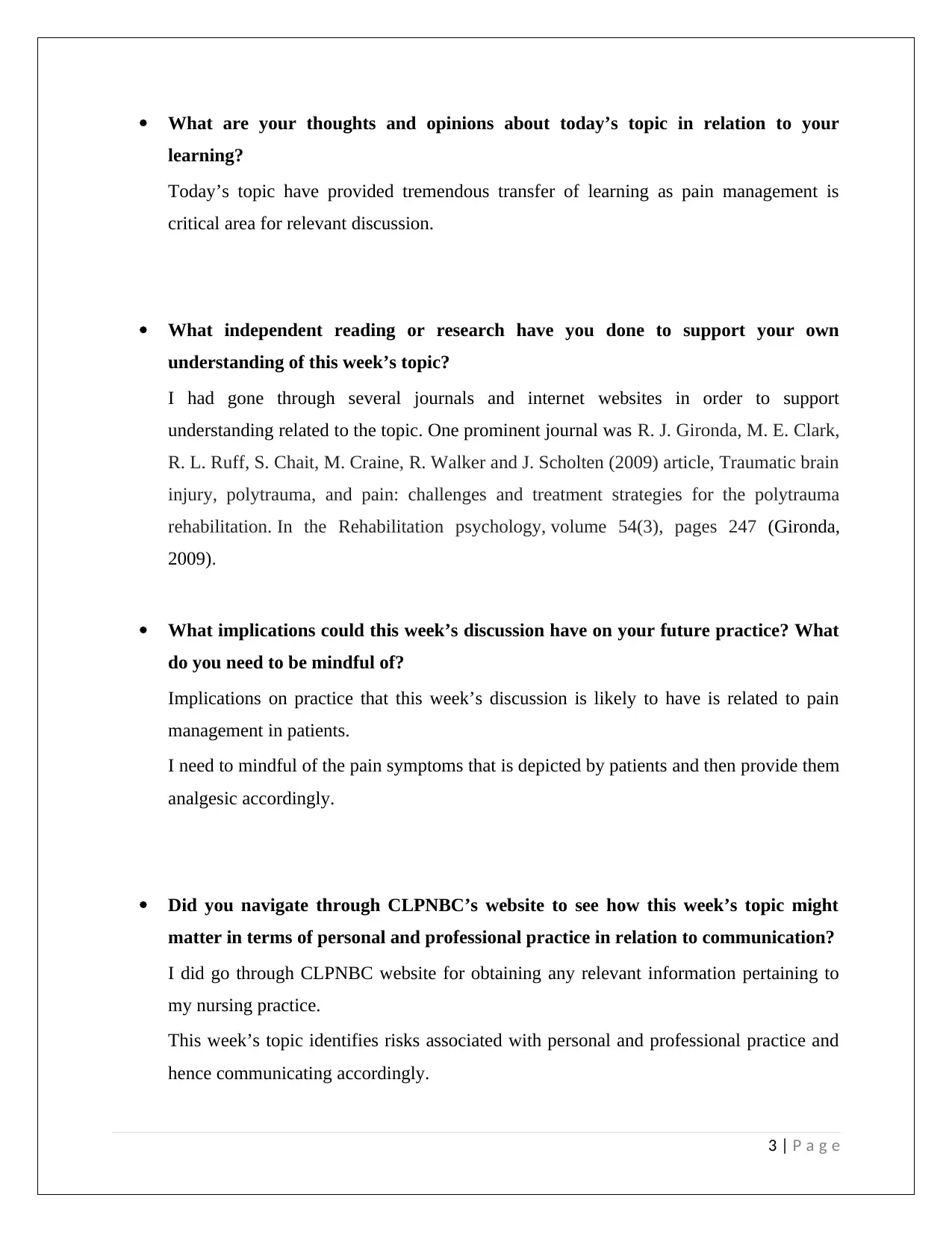
What are your thoughts and opinions about today’s topic in relation to your
learning?
Today’s topic have provided tremendous transfer of learning as pain management is
critical area for relevant discussion.
What independent reading or research have you done to support your own
understanding of this week’s topic?
I had gone through several journals and internet websites in order to support
understanding related to the topic. One prominent journal was R. J. Gironda, M. E. Clark,
R. L. Ruff, S. Chait, M. Craine, R. Walker and J. Scholten (2009) article, Traumatic brain
injury, polytrauma, and pain: challenges and treatment strategies for the polytrauma
rehabilitation. In the Rehabilitation psychology, volume 54(3), pages 247 (Gironda,
2009).
What implications could this week’s discussion have on your future practice? What
do you need to be mindful of?
Implications on practice that this week’s discussion is likely to have is related to pain
management in patients.
I need to mindful of the pain symptoms that is depicted by patients and then provide them
analgesic accordingly.
Did you navigate through CLPNBC’s website to see how this week’s topic might
matter in terms of personal and professional practice in relation to communication?
I did go through CLPNBC website for obtaining any relevant information pertaining to
my nursing practice.
This week’s topic identifies risks associated with personal and professional practice and
hence communicating accordingly.
3 | P a g e
learning?
Today’s topic have provided tremendous transfer of learning as pain management is
critical area for relevant discussion.
What independent reading or research have you done to support your own
understanding of this week’s topic?
I had gone through several journals and internet websites in order to support
understanding related to the topic. One prominent journal was R. J. Gironda, M. E. Clark,
R. L. Ruff, S. Chait, M. Craine, R. Walker and J. Scholten (2009) article, Traumatic brain
injury, polytrauma, and pain: challenges and treatment strategies for the polytrauma
rehabilitation. In the Rehabilitation psychology, volume 54(3), pages 247 (Gironda,
2009).
What implications could this week’s discussion have on your future practice? What
do you need to be mindful of?
Implications on practice that this week’s discussion is likely to have is related to pain
management in patients.
I need to mindful of the pain symptoms that is depicted by patients and then provide them
analgesic accordingly.
Did you navigate through CLPNBC’s website to see how this week’s topic might
matter in terms of personal and professional practice in relation to communication?
I did go through CLPNBC website for obtaining any relevant information pertaining to
my nursing practice.
This week’s topic identifies risks associated with personal and professional practice and
hence communicating accordingly.
3 | P a g e
⊘ This is a preview!⊘
Do you want full access?
Subscribe today to unlock all pages.

Trusted by 1+ million students worldwide
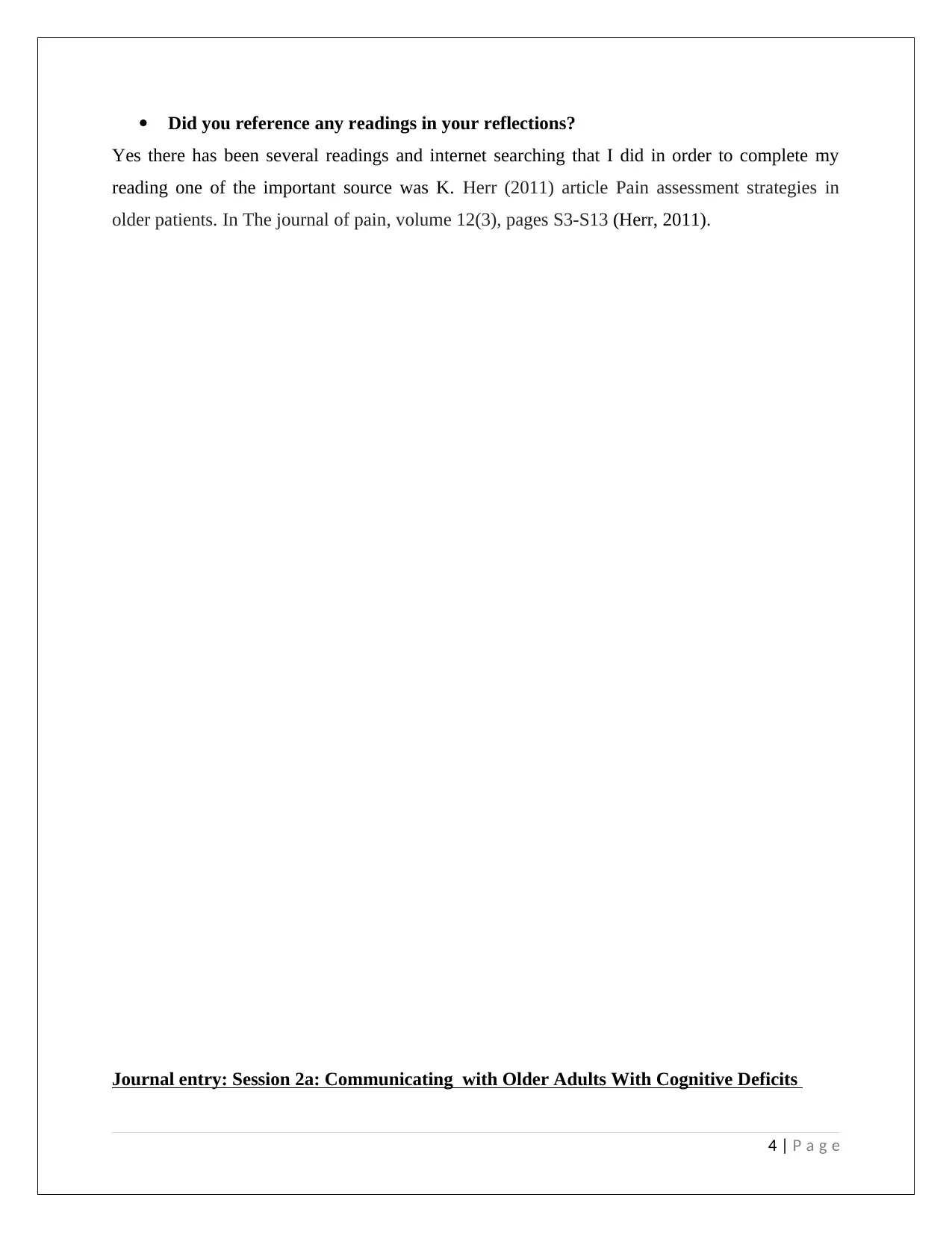
Did you reference any readings in your reflections?
Yes there has been several readings and internet searching that I did in order to complete my
reading one of the important source was K. Herr (2011) article Pain assessment strategies in
older patients. In The journal of pain, volume 12(3), pages S3-S13 (Herr, 2011).
Journal entry: Session 2a: Communicating with Older Adults With Cognitive Deficits
4 | P a g e
Yes there has been several readings and internet searching that I did in order to complete my
reading one of the important source was K. Herr (2011) article Pain assessment strategies in
older patients. In The journal of pain, volume 12(3), pages S3-S13 (Herr, 2011).
Journal entry: Session 2a: Communicating with Older Adults With Cognitive Deficits
4 | P a g e
Paraphrase This Document
Need a fresh take? Get an instant paraphrase of this document with our AI Paraphraser
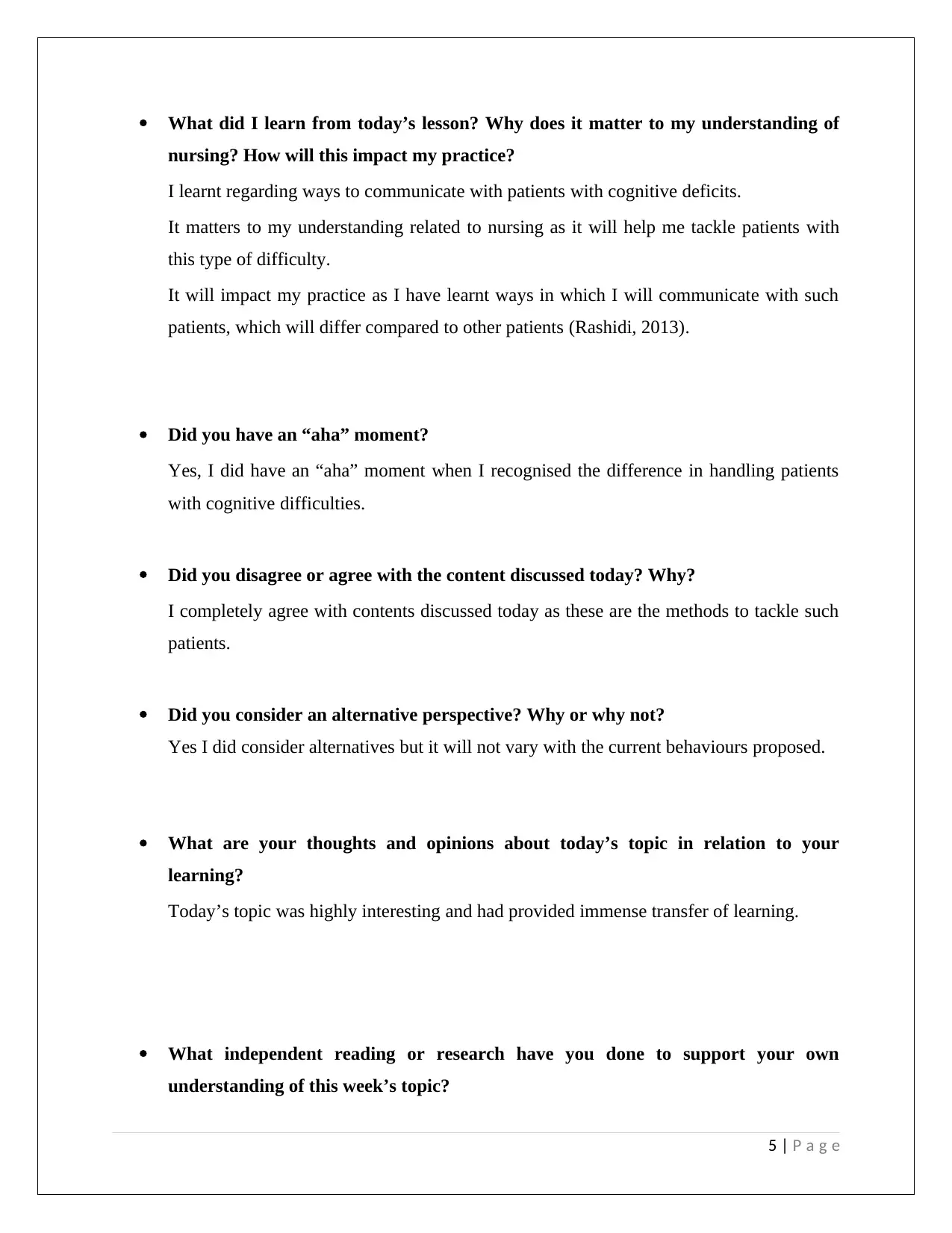
What did I learn from today’s lesson? Why does it matter to my understanding of
nursing? How will this impact my practice?
I learnt regarding ways to communicate with patients with cognitive deficits.
It matters to my understanding related to nursing as it will help me tackle patients with
this type of difficulty.
It will impact my practice as I have learnt ways in which I will communicate with such
patients, which will differ compared to other patients (Rashidi, 2013).
Did you have an “aha” moment?
Yes, I did have an “aha” moment when I recognised the difference in handling patients
with cognitive difficulties.
Did you disagree or agree with the content discussed today? Why?
I completely agree with contents discussed today as these are the methods to tackle such
patients.
Did you consider an alternative perspective? Why or why not?
Yes I did consider alternatives but it will not vary with the current behaviours proposed.
What are your thoughts and opinions about today’s topic in relation to your
learning?
Today’s topic was highly interesting and had provided immense transfer of learning.
What independent reading or research have you done to support your own
understanding of this week’s topic?
5 | P a g e
nursing? How will this impact my practice?
I learnt regarding ways to communicate with patients with cognitive deficits.
It matters to my understanding related to nursing as it will help me tackle patients with
this type of difficulty.
It will impact my practice as I have learnt ways in which I will communicate with such
patients, which will differ compared to other patients (Rashidi, 2013).
Did you have an “aha” moment?
Yes, I did have an “aha” moment when I recognised the difference in handling patients
with cognitive difficulties.
Did you disagree or agree with the content discussed today? Why?
I completely agree with contents discussed today as these are the methods to tackle such
patients.
Did you consider an alternative perspective? Why or why not?
Yes I did consider alternatives but it will not vary with the current behaviours proposed.
What are your thoughts and opinions about today’s topic in relation to your
learning?
Today’s topic was highly interesting and had provided immense transfer of learning.
What independent reading or research have you done to support your own
understanding of this week’s topic?
5 | P a g e
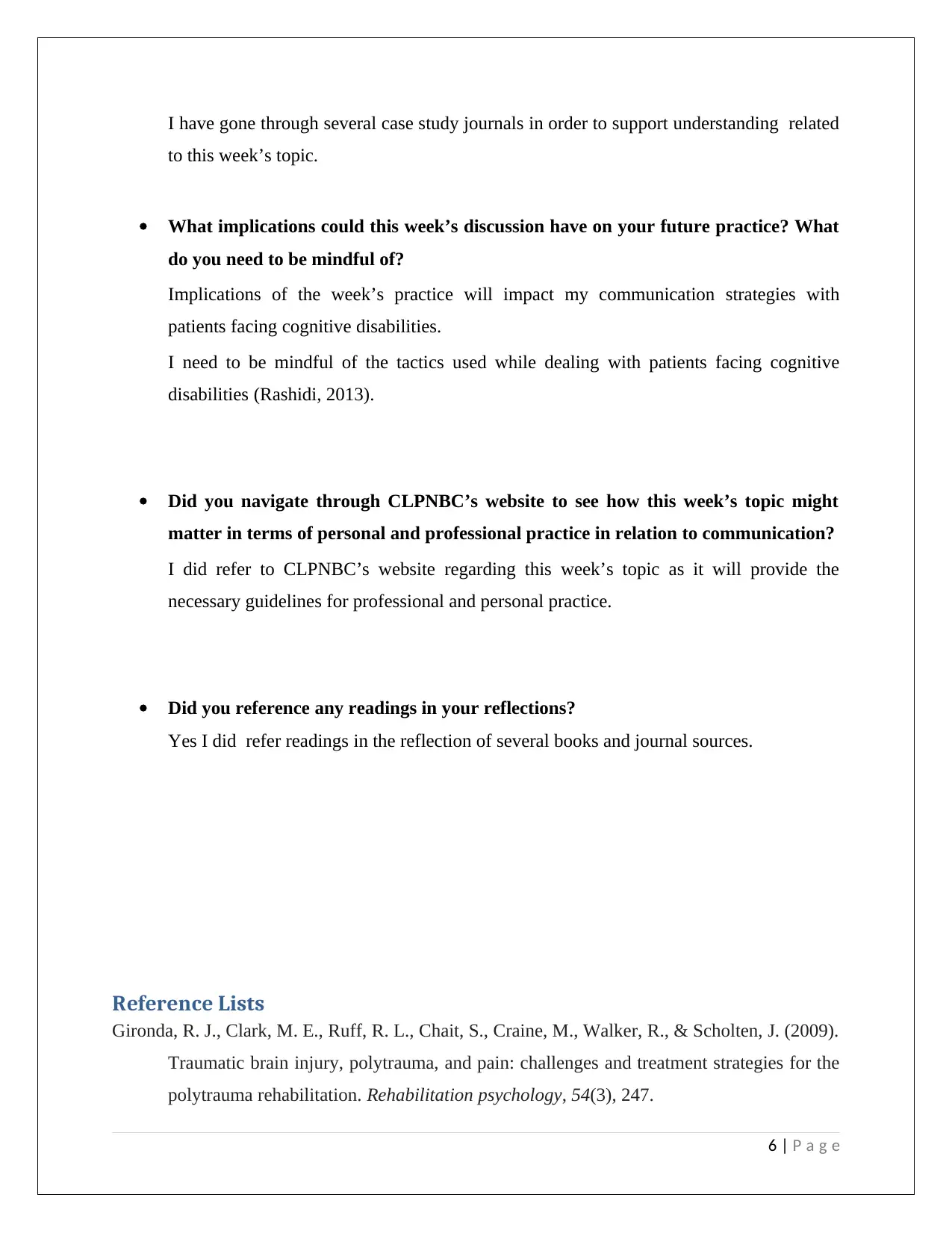
I have gone through several case study journals in order to support understanding related
to this week’s topic.
What implications could this week’s discussion have on your future practice? What
do you need to be mindful of?
Implications of the week’s practice will impact my communication strategies with
patients facing cognitive disabilities.
I need to be mindful of the tactics used while dealing with patients facing cognitive
disabilities (Rashidi, 2013).
Did you navigate through CLPNBC’s website to see how this week’s topic might
matter in terms of personal and professional practice in relation to communication?
I did refer to CLPNBC’s website regarding this week’s topic as it will provide the
necessary guidelines for professional and personal practice.
Did you reference any readings in your reflections?
Yes I did refer readings in the reflection of several books and journal sources.
Reference Lists
Gironda, R. J., Clark, M. E., Ruff, R. L., Chait, S., Craine, M., Walker, R., & Scholten, J. (2009).
Traumatic brain injury, polytrauma, and pain: challenges and treatment strategies for the
polytrauma rehabilitation. Rehabilitation psychology, 54(3), 247.
6 | P a g e
to this week’s topic.
What implications could this week’s discussion have on your future practice? What
do you need to be mindful of?
Implications of the week’s practice will impact my communication strategies with
patients facing cognitive disabilities.
I need to be mindful of the tactics used while dealing with patients facing cognitive
disabilities (Rashidi, 2013).
Did you navigate through CLPNBC’s website to see how this week’s topic might
matter in terms of personal and professional practice in relation to communication?
I did refer to CLPNBC’s website regarding this week’s topic as it will provide the
necessary guidelines for professional and personal practice.
Did you reference any readings in your reflections?
Yes I did refer readings in the reflection of several books and journal sources.
Reference Lists
Gironda, R. J., Clark, M. E., Ruff, R. L., Chait, S., Craine, M., Walker, R., & Scholten, J. (2009).
Traumatic brain injury, polytrauma, and pain: challenges and treatment strategies for the
polytrauma rehabilitation. Rehabilitation psychology, 54(3), 247.
6 | P a g e
⊘ This is a preview!⊘
Do you want full access?
Subscribe today to unlock all pages.

Trusted by 1+ million students worldwide
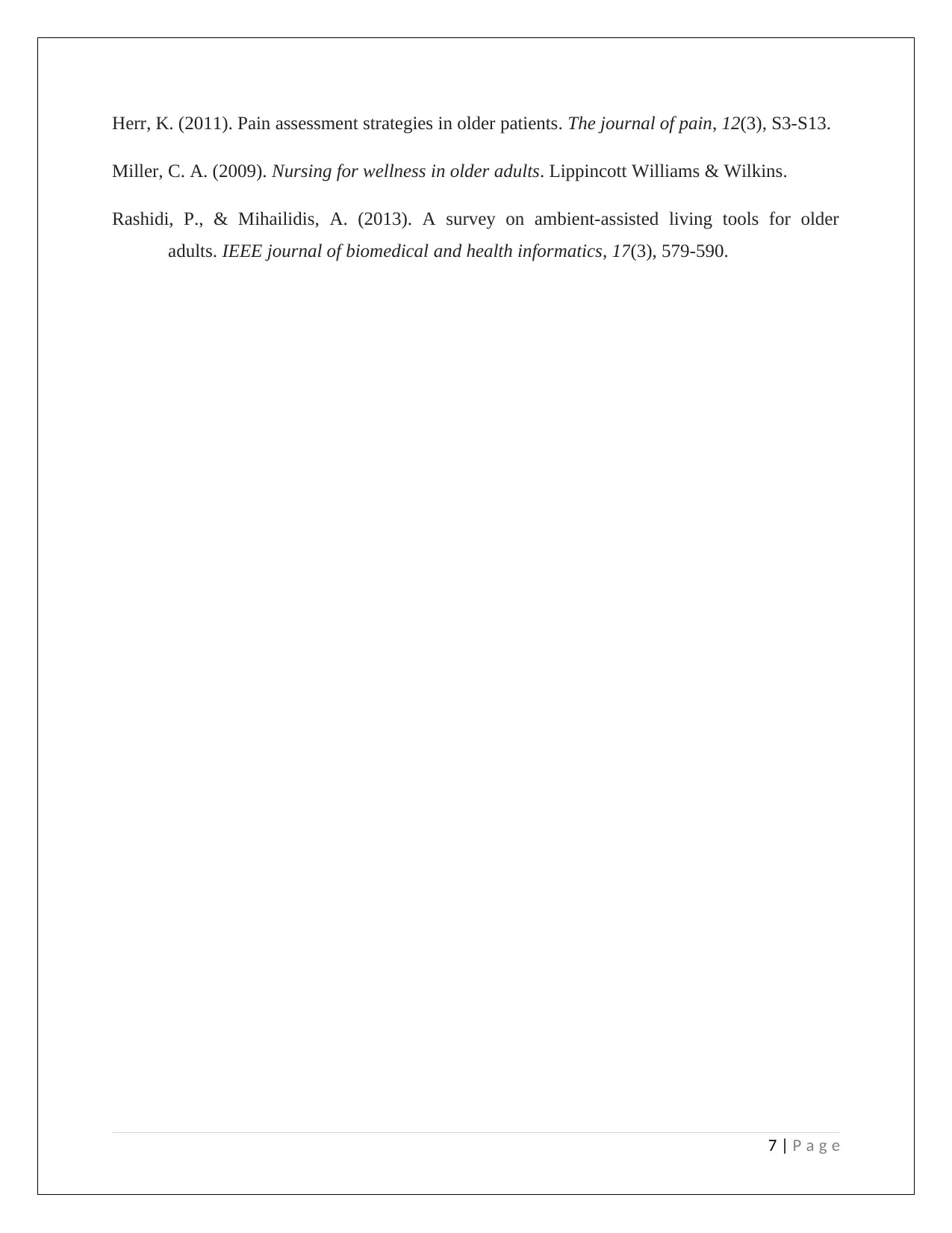
Herr, K. (2011). Pain assessment strategies in older patients. The journal of pain, 12(3), S3-S13.
Miller, C. A. (2009). Nursing for wellness in older adults. Lippincott Williams & Wilkins.
Rashidi, P., & Mihailidis, A. (2013). A survey on ambient-assisted living tools for older
adults. IEEE journal of biomedical and health informatics, 17(3), 579-590.
7 | P a g e
Miller, C. A. (2009). Nursing for wellness in older adults. Lippincott Williams & Wilkins.
Rashidi, P., & Mihailidis, A. (2013). A survey on ambient-assisted living tools for older
adults. IEEE journal of biomedical and health informatics, 17(3), 579-590.
7 | P a g e
1 out of 7
Related Documents
Your All-in-One AI-Powered Toolkit for Academic Success.
+13062052269
info@desklib.com
Available 24*7 on WhatsApp / Email
![[object Object]](/_next/static/media/star-bottom.7253800d.svg)
Unlock your academic potential
Copyright © 2020–2026 A2Z Services. All Rights Reserved. Developed and managed by ZUCOL.




